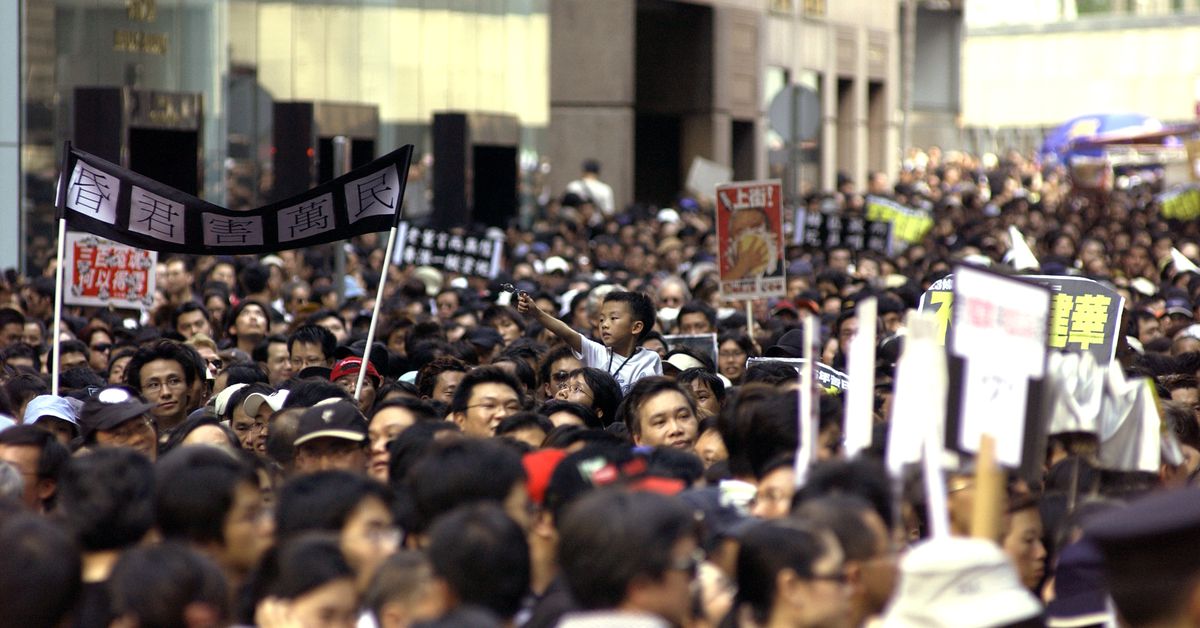21 years ago, half a million Hong Kongers took to the streets to stop Article 23. This month, Beijing finally won.
Last week, the government of Hong Kong published the latest of a series of increasingly draconian national security laws. This one will target espionage, treason, and foreign political interference, and those found guilty of violating some of its tenets could be sentenced to life imprisonment.
This might sound niche or even well-intentioned; doesn’t the US have its own fears about foreign political interference in its elections? But this isn’t really about national security. It is, as Human Rights Watch put it, “Beijing’s latest effort to transform Hong Kong from a free society to an oppressed one where people live in fear.”
That effort has been underway at varying speeds since Hong Kong was returned to Beijing’s control in 1997. It is now all but complete.
Despite complaints from foreign governments, from what remains of Hong Kong civil society, and even from the city’s increasingly beleaguered international business community, Hong Kong’s now opposition-less legislature will almost assuredly fast-track it into law.
I view Hong Kong as one of the casualties of the Trump presidency that we haven’t had the energy or attention to really understand.
Any typical, competent US government - either Democrat or pre-Trump Republican - would have been laser focused on a pressure campaign and diplomacy that I’m confident would have prevented China from breaking Hong Kong’s democratic institutions, which shifted decisively in 2019.
There’s nothing to say or do anymore to help, it’s just so freaking sad.
No fucking way, Hong Kong was lost in 2014 after the yellow umbrella movement was brutally crushed. It was death by a thousand cuts ever since. Trump or no Trump, nothing was going to change that.
More like 1997, or even 1983, when the UK handed them back to China, or the earlier date, when they decided to prevent them from having British citizenship.
If everyone in Hong Kong had the right to emigrate to any British territory, China would have to be a lot lighter touched there, or there might be a mass exodus.
There was a period in the early 2000’s where China showed genuine signs it might open up and become somewhat democratic, giving its citizens greater rights and representation. Obviously they decided to revert to their authoritarian ways and brutally crack down on dissent to keep control over the people, but there was a time HK might’ve had a nice future under China.
If Trump won another term, Taiwan will suffer the same fate for sure.
This is the best summary I could come up with:
This one will target espionage, treason, and foreign political interference, and those found guilty of violating some of its tenets could be sentenced to life imprisonment.
It is, as Human Rights Watch put it, “Beijing’s latest effort to transform Hong Kong from a free society to an oppressed one where people live in fear.”
It wasn’t until nearly six years after the 1997 handover that Hong Kong’s government, with more than a little nudging from Beijing, made a serious effort to pass a law that would fulfill Article 23.
That alarmed pro-democracy groups in Hong Kong, where hundreds of thousands of people from China had found refuge following the Chinese Communist Party’s takeover of the mainland in 1949, as well as the city’s vibrant Christian churches, which feared being forced out of existence.
They were angry about the Article 23 legislation, about the way their government had mismanaged the SARS outbreak earlier that year, and about the dwindling opportunities for good jobs and decent housing.
Legislation was introduced to bring “moral and national education” to Hong Kong’s curriculum, code for Beijing’s view of history, and what limited representation existed in the city’s legislature was further constrained.
The original article contains 968 words, the summary contains 196 words. Saved 80%. I’m a bot and I’m open source!



